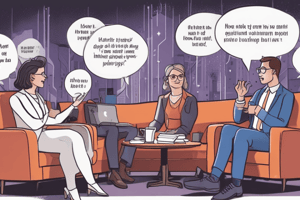Podcast
Questions and Answers
What is the primary reason for asking a candidate about their personal qualities necessary for a job?
What is the primary reason for asking a candidate about their personal qualities necessary for a job?
- To evaluate their technical skills.
- To predict their ability to shirk less desirable tasks.
- To assess their understanding of the job and dedication. (correct)
- To determine their familiarity with management terminology.
When asking about a candidate's progress, what primary insight is the interviewer seeking?
When asking about a candidate's progress, what primary insight is the interviewer seeking?
- Their interest in the role
- Their ability to over inflate their previous experiences.
- Their level of self-confidence and how they perceive their professional journey. (correct)
- Their past technical achievements.
Why is it important to follow up a 'Do you consider yourself successful?' question with 'Why?'
Why is it important to follow up a 'Do you consider yourself successful?' question with 'Why?'
- To analyze their motivation, multitasking, and determination. (correct)
- To get a simple 'yes' or 'no' answer.
- To identify any potential weaknesses.
- To understand their technical background.
When a candidate is asked about their greatest weakness, what is the interviewer primarily looking for?
When a candidate is asked about their greatest weakness, what is the interviewer primarily looking for?
When a candidate is asked, 'What plans do you have to improve your professional performance?' what is the primary goal for the interviewer?
When a candidate is asked, 'What plans do you have to improve your professional performance?' what is the primary goal for the interviewer?
What is a key aspect of 'will do' that managers should assess during interviews?
What is a key aspect of 'will do' that managers should assess during interviews?
The 'clock watchers' are characterized by which of the following behaviors?
The 'clock watchers' are characterized by which of the following behaviors?
What crucial error do many interviewers commonly make when assessing candidates according to the text?
What crucial error do many interviewers commonly make when assessing candidates according to the text?
What strategy should managers use to approach candidates with low motivation?
What strategy should managers use to approach candidates with low motivation?
In the context of motivating the workforce, the text emphasizes that it is important to consider motivation as:
In the context of motivating the workforce, the text emphasizes that it is important to consider motivation as:
What is the primary attribute a hiring manager should be assessing when asking about a candidate's past failures?
What is the primary attribute a hiring manager should be assessing when asking about a candidate's past failures?
Why might a question like, 'What did you dislike about your last job?' be useful in an interview, even though it's a common question?
Why might a question like, 'What did you dislike about your last job?' be useful in an interview, even though it's a common question?
Which of the following best describes the interviewer's goal when asking about a candidate's ability to handle multiple projects at once?
Which of the following best describes the interviewer's goal when asking about a candidate's ability to handle multiple projects at once?
What should interviewers be cautious of when a candidate describes working an excessive amount of extra hours?
What should interviewers be cautious of when a candidate describes working an excessive amount of extra hours?
What is the primary focus when asking candidates about systems or methods they've used for accomplishing a job?
What is the primary focus when asking candidates about systems or methods they've used for accomplishing a job?
What is the primary purpose of asking a candidate about a project they enjoyed?
What is the primary purpose of asking a candidate about a project they enjoyed?
Why is it important to inquire about a responsibility or project that a candidate did not enjoy?
Why is it important to inquire about a responsibility or project that a candidate did not enjoy?
What does asking "How do you deal with complex problems in your job?" reveal about a candidate?
What does asking "How do you deal with complex problems in your job?" reveal about a candidate?
When asking 'What are some of the things you find difficult to do?', what is an interviewer primarily trying to examine?
When asking 'What are some of the things you find difficult to do?', what is an interviewer primarily trying to examine?
What is the benefit of using the follow-up question 'Where/to whom do you turn for help?' when a candidate describes a difficult task or problem?
What is the benefit of using the follow-up question 'Where/to whom do you turn for help?' when a candidate describes a difficult task or problem?
When assessing responses to 'What kinds of decisions are most difficult for you?', what should an interviewer be primarily looking for?
When assessing responses to 'What kinds of decisions are most difficult for you?', what should an interviewer be primarily looking for?
When evaluating a candidate's response to 'Tell me about a time when a difficult decision had to be made quickly', what should the interviewer weigh more heavily?
When evaluating a candidate's response to 'Tell me about a time when a difficult decision had to be made quickly', what should the interviewer weigh more heavily?
What is the primary purpose of asking a candidate, 'Tell me about a time when you put your foot in your mouth?'
What is the primary purpose of asking a candidate, 'Tell me about a time when you put your foot in your mouth?'
What is the primary focus when evaluating a candidate's response to the question 'How do you plan your day?'
What is the primary focus when evaluating a candidate's response to the question 'How do you plan your day?'
What does a 'blank look' or 'hesitancy' from a candidate when asked about project organization suggest?
What does a 'blank look' or 'hesitancy' from a candidate when asked about project organization suggest?
What is gap analysis, in the context of a project?
What is gap analysis, in the context of a project?
When evaluating a candidate's response about a past project where information was gathered from multiple sources, what main attributes should be considered, besides project applicability?
When evaluating a candidate's response about a past project where information was gathered from multiple sources, what main attributes should be considered, besides project applicability?
What is the primary purpose of asking a candidate if they set goals for themselves?
What is the primary purpose of asking a candidate if they set goals for themselves?
What should you be cautious about when a candidate states they 'always reach their goals'?
What should you be cautious about when a candidate states they 'always reach their goals'?
According to the content, what is generally learned more from?
According to the content, what is generally learned more from?
What is the 'Plan/Do/Review cycle' in the context of the content?
What is the 'Plan/Do/Review cycle' in the context of the content?
Why is a candidate’s ability to show resilience after a setback or failure important?
Why is a candidate’s ability to show resilience after a setback or failure important?
Flashcards
Clock Watchers
Clock Watchers
Refers to employees who are competent in their tasks but lack motivation to perform them effectively, only doing the minimum necessary to stay employed.
Can Do
Can Do
The ability to perform a job effectively, possessing the necessary skills, knowledge, and experience.
Will Do
Will Do
The willingness and drive to go beyond basic requirements, showing enthusiasm, dedication, and commitment to the job and organization.
Separating 'Can Do' from 'Will Do'
Separating 'Can Do' from 'Will Do'
Signup and view all the flashcards
Motivation (in this context)
Motivation (in this context)
Signup and view all the flashcards
What is your greatest weakness?
What is your greatest weakness?
Signup and view all the flashcards
In hindsight, in what ways could you have improved your progress?
In hindsight, in what ways could you have improved your progress?
Signup and view all the flashcards
Do you consider yourself successful?
Do you consider yourself successful?
Signup and view all the flashcards
What is your greatest strength?
What is your greatest strength?
Signup and view all the flashcards
What plans do you have to improve your professional performance?
What plans do you have to improve your professional performance?
Signup and view all the flashcards
Problem-Solving Question
Problem-Solving Question
Signup and view all the flashcards
Layering Technique
Layering Technique
Signup and view all the flashcards
Challenging Situation Question
Challenging Situation Question
Signup and view all the flashcards
Difficult Decision Question
Difficult Decision Question
Signup and view all the flashcards
Motivational Question
Motivational Question
Signup and view all the flashcards
Strengths & Weaknesses Question
Strengths & Weaknesses Question
Signup and view all the flashcards
Problem-Solving Question (Technical)
Problem-Solving Question (Technical)
Signup and view all the flashcards
Resilience
Resilience
Signup and view all the flashcards
Analyzing Failures
Analyzing Failures
Signup and view all the flashcards
Multitasking
Multitasking
Signup and view all the flashcards
Going Above and Beyond
Going Above and Beyond
Signup and view all the flashcards
Rescheduling Workload
Rescheduling Workload
Signup and view all the flashcards
What's the root of the problem?
What's the root of the problem?
Signup and view all the flashcards
Tell me about a time you put your foot in your mouth.
Tell me about a time you put your foot in your mouth.
Signup and view all the flashcards
How do you plan your day?
How do you plan your day?
Signup and view all the flashcards
How do you organize, plan, and execute your projects?
How do you organize, plan, and execute your projects?
Signup and view all the flashcards
Tell me about a job where you gathered information from many sources.
Tell me about a job where you gathered information from many sources.
Signup and view all the flashcards
Do you set goals for yourself?
Do you set goals for yourself?
Signup and view all the flashcards
Tell me about a time you failed to reach a goal.
Tell me about a time you failed to reach a goal.
Signup and view all the flashcards
What plans do you have to improve your performance?
What plans do you have to improve your performance?
Signup and view all the flashcards
Study Notes
Motivational Interview Questions
- Assessing "Will Do" alongside "Can Do": Success as a manager hinges on getting work done through others. Use scenarios (e.g., office fire) to observe how colleagues react. Ideal hires strive to make a difference, not just clock-watchers who exert minimum effort. Don't hire candidates who are competent but lack motivation or have unrealistic expectations (e.g., "won't do if I don't like Tim").
Understanding Motivation
- Motivation Defined: Motivation is energy for tackling challenges, coupled with a commitment to meet daily job demands—pleasant or unpleasant. Look for enthusiastic, intelligent candidates with a holistic understanding of job requirements.
- Self-Esteem and Self-Awareness: Questions assess the candidate's understanding of job challenges and dedication to critical deliverables. Example questions include: “What personal qualities do you think are necessary to make a success of this job?” and “What supporting skills and behaviors help you do your job well?” Prefer questions about "personal qualities" to those about "transferable skills," as they are better understood by the public. Probe for systems and procedure adherence, multitasking skills.
Productivity, Professional Development, and Self-Esteem
- Progress Assessment: Assess confidence and perceived ability. A positive self-assessment is valuable, but also probe for potential overestimation with follow-up "negative-balance" questions (e.g., "In hindsight, in what ways could you have improved your progress?"). Look for candidates who learn from mistakes and exhibit good judgment.
- Success Evaluation: Open-ended questions ("Do you consider yourself successful? Why?") reveal motivation, multitasking skills, and determination, as well as any perceived limitations.
- Peer Ranking: Gauge self-image, especially in quantifiable roles (e.g., sales). Validate peer rankings with follow-up queries and reference checks.
- Professional Advancement Plans: Assess the understanding of ongoing professional development. Look not for the answer, but for demonstration of understanding career necessities.
Achievements, Strengths, and Weaknesses
- Proudest Achievements: Identify candidates' priorities. Align their priorities with organizational needs. Lack of proud achievements might indicate limited technical skills or motivation.
- Greatest Strengths: Assess transferable skills, professional values, and the achievements they enable. Do not merely accept answers; probe.
- Greatest Weaknesses: The importance of negative balance through follow-up questions. Expect honesty and self-awareness. Avoid candidates who offer vague or general weaknesses (e.g., working too hard).
- Projects and Responsibilities: Understanding motivations, strengths, and weaknesses. Learn about project engagement by querying "tell me about a responsibility you enjoyed?" and "Tell me about your experience with a project that got you excited?"
Critical Thinking and Problem Solving
- Handling Complex Problems: Candidates' awareness of job complexities is a critical filter. Use past-performance examples and the layering technique (who, what, where, when, why, and how) to dig deeper.
- Difficult Decisions: Assess critical-thinking ability, the ability to work with systems and procedures, and possible lack of experience or a need for advanced training.
- Difficult Situations, Challenges, and Crises: Find out how the candidate analyzes, resolves problems, learns from mistakes, and how their approach differs from others.
Multitasking and Energy
- Planning and Organization: Judge candidate's understanding of time management, planning, and multitasking. Combine these questions with the specifics of the job to observe task vs. goal-oriented mentality.
- Project Management: Examine whether candidates can break down assignments, manage priorities, and use milestones and contingency plans.
- Information Gathering and Project Execution: Look for logical, methodical approaches.
- Goal Setting: Ascertain a candidate's priorities, professional values, ambition, and determination. Expect setbacks and resilience in professional growth.
- Failures and Setbacks: Assess resiliency, how candidates identify and learn from failures. A smart professional accepts responsibilities for failures and learns from them.
Commitment, Reliability, and Stress Management
- Going Above and Beyond: Identify candidates' commitment levels and the circumstances in which they might be willing to work beyond normal expectations.
- Emergency Rescheduling: Examine candidates' commitment to their jobs, expectations, and work habits.
- Systems and Work Methods: Assess creativity, critical thinking, and multitasking abilities through questions about a candidate's system of working. Evaluate the candidate's process for success/failures of individual or corporate-level initiatives.
Additional Considerations
- Motivation Assessment: Judge candidates' willingness to work hard, learn, and contribute to the organisation's success, even if they are fully experienced.
- Teamwork and Manageability: Assess their potential for effective teamwork.
Studying That Suits You
Use AI to generate personalized quizzes and flashcards to suit your learning preferences.





